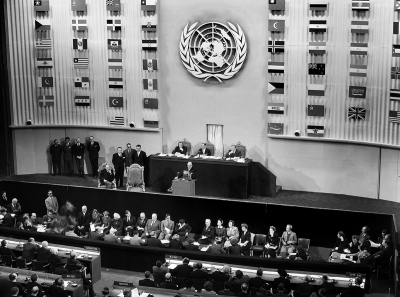The Universal Declaration of Human Rights: 75th anniversary (part 1)

This year marks the 75th anniversary of the United Nation’s adoption of the “Universal Declaration of Human Rights” (UDHR). The U.N. General Assembly meeting in Paris, Dec. 10, 1948, voted overwhelmingly to adopt the UDHR (General Assembly Resolution 217A). There were 58 members of the U.N. at the time (48 voted in favor, with 8 abstaining and 2 not voting). Six Soviet bloc nations abstained, and Saudi Arabia abstained because of the religious freedom guarantees.
To understand the true significance of this foundational document, one must understand the historical context and moral maelstrom that produced it. The world had just experienced the previously unimaginable civilizational horror of the Nazi Holocaust and the grotesque general worldwide slaughter and carnage precipitated by the Second World War.
The further unprecedented destructive specter of the world’s sudden entrance into the Atomic Age by the bombing of Hiroshima and Nagasaki drove the U.N. at its first session of the U.N. General Assembly in 1946 to commence work on what became the UDHR in December, 1948.
One of the major figures driving the project forward was Mrs. Eleanor Roosevelt, the widow of President Franklin Roosevelt.
This was altogether fitting because the origins of the UDHR can be traced back to FDR’s State of the Union Speech delivered to the U.S. Congress on Jan. 6, 1941. On that date, Germany had been at war with the United Kingdom since September 1939. America was still at peace.
In his State of the Union address, FDR, safely reelected to an unprecedented third term as president the previous November, launched into a policy defense of assisting the British in their war against Germany.
In what is widely known as the “Four Freedoms” speech, FDR pronounced “Four Freedoms” which must be the goal and purpose of fighting the war raging in Europe. The president declared, “As men do not live by bread alone, they do not fight by armaments alone.” In other words, there must be goals and principles which inspire people to fight.
The president then launched into his articulation of the “Four Freedoms.”
“In future days, which we seek to make secure, we look forward to a world founded upon Four Freedoms.
“The first is freedom of speech, and expression—everywhere in the world.
“The second is freedom of every person to worship God in his own way—everywhere in the world.
“The third is freedom from want—which translated into world terms, means economic understandings which will secure to every nation a healthy peacetime life for its inhabitants— everywhere in the world.
“The fourth is freedom from fear—which translated into world terms, means a worldwide reduction of armaments to such a point and in such a thorough fashion that no nation will be in a position to commit an act of physical aggression against any neighbor—anywhere in the world.
“That is no vision for a distant millennium.
“It is a definite basis for a kind of world attainable in our own time and generation.
“That kind of world is the very antithesis of the so-called new order of tyranny which the dictators seek to create with the crash of a bomb.”
President Roosevelt was serving notice to the isolationists that he was going to put the resources of America against the Axis Powers.
Then on Aug. 9, 1941, just six months after his State of the Union address, President Roosevelt met with British Prime Minister Winston Churchill onboard the USS Augusta off the coast of Canada. Upon meeting, Churchill said, “At long last, Mr. President.” FDR replied, “Glad to have you aboard, Mr. Churchill.” This meeting occurred less than a month after Hitler invaded the Soviet Union.
On Aug. 14, just five days later, this meeting produced the “Atlantic Charter,” which embodied the Four Freedoms and set out British and American goals for the world after World War II, just months before Pearl Harbor brought America into the war. The “Atlantic Charter” joint statement indeed outlined the British and American goals for a post-war world.
Within days of the signing of the Atlantic Charter the British “bombed” Germany with millions of pamphlets seeking to assure Germany if they were to cease hostilities, there would not be a harsh and punitive peace imposed on Germany, citing the Atlantic Charter as a promise not to impose drastic economic sanctions and that Germany could flourish in peace.
Thus, the Four Freedoms became the rallying cry to answer, “What Are We Fighting For?...” The Four Freedoms became the summary of the Allies’ War aims.
The American artist Norman Rockwell produced what became famous paintings for each of the Four Freedoms in 1943 and they ran over a consecutive four-week period in the Saturday Evening Post. The paintings toured the U.S. as part of traveling War Bond drives and raised over $132 million (the equivalent of $2.3 billion in 2023 dollars) in war bonds and the paintings became some of the most familiar artworks produced during World War II.
In fact, when I became president of the Southern Baptist Convention’s Ethics & Religious Liberty Commission in 1988, one of the first things I did was order framed reproductions of each of the four paintings and had them hung in a prominent place in our offices in Nashville.
As soon as the United Nations was formed at the end of World War II, serious work began on the “Universal Declaration of Human Rights,” leading to its passage in December 1948.
The “Four Freedoms” are suffused throughout the UDHR. Clearly, the “Four Freedoms” and the UDHR illustrate that the Second World War resulted in a Anglo-American alliance consciously determined to “universalize” basic human rights. The Universal Declaration of Human Rights is a tremendous example of their success. The fact that the UDHR has been so well-received as the basic standard across the globe (at least in the aspirational sense) underscores their success.
The UDHR articulates in its 30 articles every human being’s basic, fundamental rights and freedoms and affirms those rights as universal and unalienable. The UDHR directly led to the development of the concept of international human rights law. The UDHR has been translated into 530 different languages, the most of any document in human history, one more illustration of its universal appeal in speaking to the human spirit’s yearning for freedom.
More next week.
Dr. Richard Land, BA (Princeton, magna cum laude); D.Phil. (Oxford); Th.M (New Orleans Seminary). Dr. Land served as President of Southern Evangelical Seminary from July 2013 until July 2021. Upon his retirement, he was honored as President Emeritus and he continues to serve as an Adjunct Professor of Theology & Ethics. Dr. Land previously served as President of the Southern Baptist Convention's Ethics & Religious Liberty Commission (1988-2013) where he was also honored as President Emeritus upon his retirement. Dr. Land has also served as an Executive Editor and columnist for The Christian Post since 2011.
Dr. Land explores many timely and critical topics in his daily radio feature, “Bringing Every Thought Captive,” and in his weekly column for CP.




























